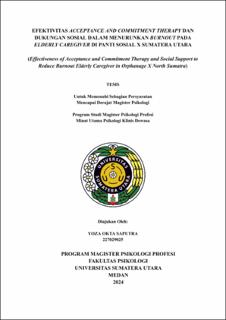Efektivitas Acceptance and Commitment Therapy dan Dukungan Sosial dalam Menurunkan Burnout pada Elderly Caregiver di Panti Sosial X Sumatera Utara
The Effectiveness of Acceptance and Commitment Therapy and Social Support in Reducing Burnout Among Elderly Caregiver in Social Orphanage X North Sumatra

Date
2024Author
Saputra, Yoza Okta
Advisor(s)
Hasnida
Tuapattinaja, Josetta Maria Remila
Metadata
Show full item recordAbstract
Humans undergo a developmental process, one stage of which is becoming
elderly. An elderly person is defined as someone who has reached the age of 60 or
older. At this stage, individuals tend to become more selective with their social
environment. Ideally, the elderly should be cared for by their families to receive
proper attention and care. However, with the evolving times and increasing life
demands, many children or families feel burdened by the responsibility of caring
for the elderly, resulting in many of them being placed in care homes. In these
facilities, elderly caregivers provide assistance to the residents. Interviews
revealed that a single elderly caregiver is often responsible for approximately 20
elderly individuals. This situation is physically and emotionally exhausting for the
caregivers, often leading to burnout. Therefore, effective interventions are
necessary to help reduce burnout among elderly caregivers. One such intervention
is through Acceptance and Commitment Therapy (ACT) combined with social
support. This study employed purposive sampling, involving a total of 9
participants. Data collection utilized three scales: the burnout scale, the
psychological flexibility scale, and the social support scale. The analysis techniques used in this research were the N-Gain test and the Mann-Whitney test.
The findings indicate the effectiveness of Acceptance and Commitment Therapy
and social support in reducing burnout among elderly caregivers. The success of
this study in reducing burnout was also influenced by the formation of a self-help
group, which served as a space for participants to share stories, express concerns,
and support one another. It is hoped that participants will continue to maintain
the self-help group as a vital step in preventing burnout in the future.
